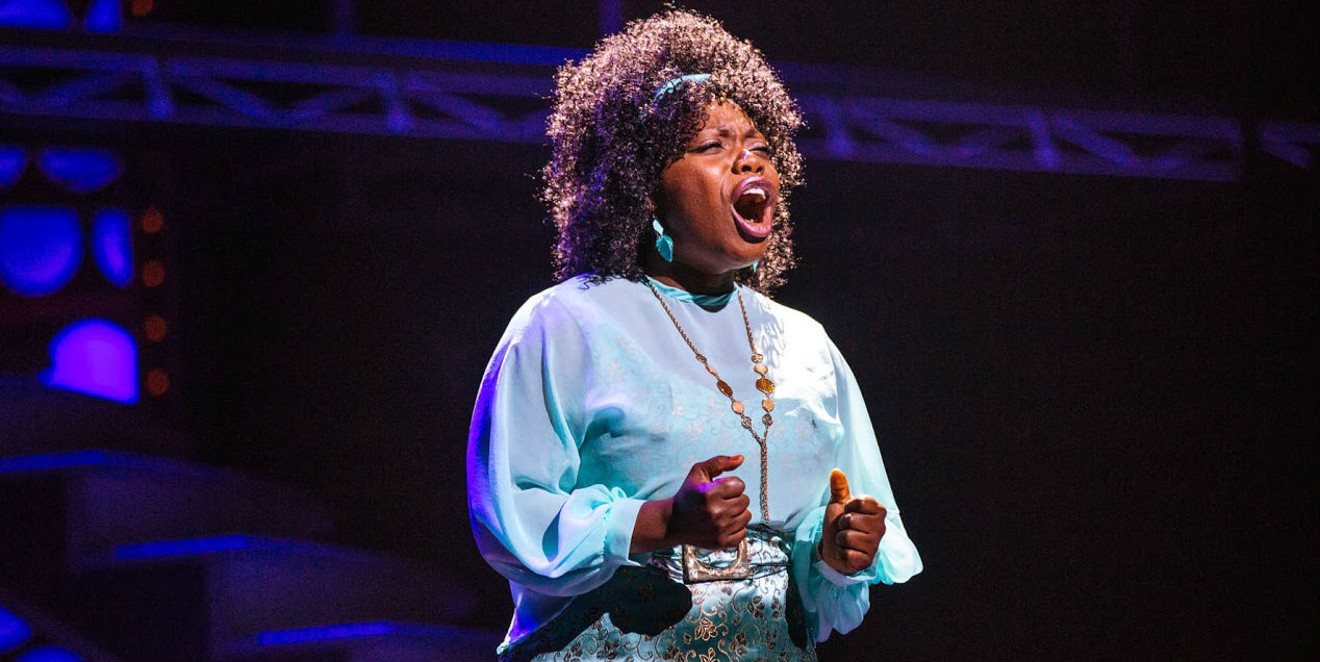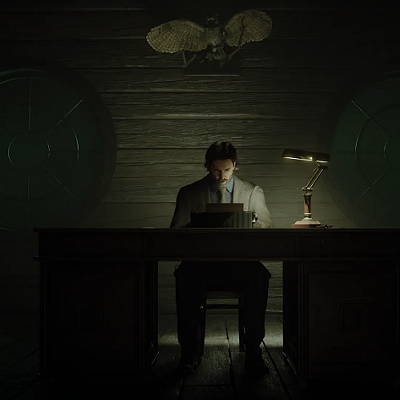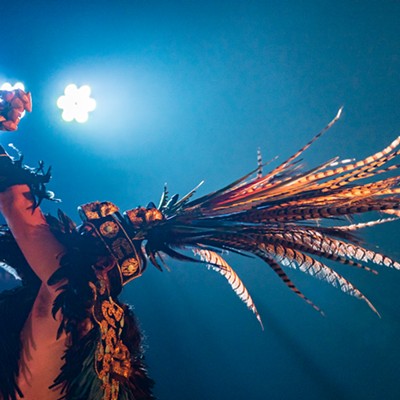Support Us
Houston's independent source of
local news and culture
account
- Welcome,
Insider - Login
- My Account
- My Newsletters
- Contribute
- Contact Us
- Sign out

Zonya Love as Effie White in Dreamgirls.
Photo by Os Galindo
[
{
"name": "Related Stories / Support Us Combo",
"component": "11591218",
"insertPoint": "4",
"requiredCountToDisplay": "4"
},{
"name": "Air - Billboard - Inline Content",
"component": "11591214",
"insertPoint": "2/3",
"requiredCountToDisplay": "7"
},{
"name": "R1 - Beta - Mobile Only",
"component": "12287027",
"insertPoint": "8",
"requiredCountToDisplay": "8"
},{
"name": "Air - MediumRectangle - Inline Content - Mobile Display Size 2",
"component": "11591215",
"insertPoint": "12",
"requiredCountToDisplay": "12"
},{
"name": "Air - MediumRectangle - Inline Content - Mobile Display Size 2",
"component": "11591215",
"insertPoint": "4th",
"startingPoint": "16",
"requiredCountToDisplay": "12"
}
,{
"name": "RevContent - In Article",
"component": "12527128",
"insertPoint": "3/5",
"requiredCountToDisplay": "5"
}
]
“We're not the girls we used to be,” the gal trio with their own trio of dreams sings at the start of Act II.
No kidding. In their dazzling gowns, slick choreography and No. 1 hit records, success is theirs, although, naturally, because this is a “showbiz” story, happiness, fame and fortune come at a steep price.
The clichés fall into place with the rhythmic clunk of Ruby Keeler tapping in an antique Warner Bros. backstager, but do we care? Not really, because Henry Krieger's atmospheric music and Tom Eyen's clever book and lyrics for the award-winning Dreamgirls (1981) sweep us through the history of black pop music, circa the '60s and '70s, with a nostalgic effervescence that's positively hypnotic.
The show, a production from Theatre Under the Stars, while not nearly as grand as Michael Bennett's $3 million original Broadway blockbuster, is still fluid and emotionally stirring. The gargantuan light towers that practically danced on the Great White Way are overtly suggested in the background by set designer Kevin Depinet, replaced on stage by a large turntable with multiple staircases which manages to keep everything gliding smoothly. The scene changes are nimble and fleet, as we move simultaneously from backstage to front of house. The action is non-stop.
Thanks to Krieger's nonstop music, the show moves slickly. It can't stop, because the characters won't let it. For this isn't just the story of the rise of the three Dreamettes: Deena (the pretty one, Phoenix Best), Lorrell (the sensible one, Ta'nika Gibson) and Effie (the uniquely talented one, Zonya Love). Their story is intertwined with manager Curtis (Thomas Hobson), Effie's song-writing brother CC (Wonza Johnson) and soul singer deluxe Jimmy “Thunder” Early (E. Clayton Cornelious). These three guys have dreams of their own, too. The interplay between these six different characters overlays the musical with a prickly frisson that elevates the standard “you're-going-out-a-nobody-but-coming-back-a-star” plot we know in our sleep.
Loosely based on the tale of the beloved Supremes, what sets Dreamgirls apart is how black artists insinuated their own distinct rhythm, melody and vocal prowess into the white music world and crossed over to the pop charts, forever changing the sound. Shady agent and business manager Curtis instinctively knows this and bends the burgeoning “Dreamettes” to his vision. Unscrupulous, and later resorting to payola to make his dreams a reality, he aches to be a major player. He knows what the public wants, he feels it. Music is changing, and he's going to be the one who makes it happen. His instincts are true, his ear infallible, but his methods will eventually crush him when most successful.
Dreamgirls has always been a showcase for Effie, ever since Tony-winner Jennifer Holliday, who twice backed out while the musical was in development, belted the immortal “And I Am Telling You, I'm Not Going,” her iconic Helen Morgan torch song that ends Act I. Quarrelsome, neurotic, difficult, Effie has the best voice among her three young friends who dream of being successful, but when the girl group achieves national fame and television exposure, sleek Deena is promoted to lead singer. Effie's relegated to backup.
When jealousy, insecurity and ego overwhelm her, Effie is fired. She no longer fits the glamorous image Curtis has envisioned for the trio's new pop look and sound. That she's had an affair with Curtis doesn't faze the opportunist. He knows what's best for the future of the newly christened “Dreams.” He moves on to luxurious Deena.
Love is a powerhouse, no doubt about it, and she limns Effie with gospel-infused vocals that recall Mahalia Jackson's deep timbre and rock-solid sincerity. She sets the Hobby afire.
A singer with unshakable conviction, Cornelious's brash Jimmy Early is another force of nature. A sexy growler of soul, his Jimmy is the musical's high point. He's a one-man Soul Train, a showstopper of the highest caliber. Against the grain, he allows himself to be molded by Curtis into a more palatable white-bread commodity, a dash of Vic Damone, a touch of Perry Como. Sooner or later, this false persona is so against his grain that he snaps during a performance. Curtis drops him, too, but as a glorious throwback to pop music's prehistory, Early vows to return. “Jimmy's got soul!” It's one of those classic moments of defiance that elicit spontaneous audience applause.
As for the character of Diana Ross, I mean Deena Jones, Best is extremely photogenic in those outrageous Louis XIV curly wigs and Las Vegas couture dresses, but where is she? Where's the panther glamour, the hotness, the star quality that Ross exuded without breaking a sweat? Where the hell is the diva-to-be? Your eyes go to everyone else onstage, but not to her. She's a lovely ingenue, has a rousing voice, but there's not enough there to keep our attention. You wonder what secrets the show might reveal had Gibson (as long-suffering Lorrell) starred instead. Her showstopper, “Ain't No Party,” although performed far on the side of the stage, is full of distinctive sound and fury. This lady is a diva-in-waiting.
Five out of six leading characters is still a stunning batting average. Although Jeffrey Polk's choreography is a bit too bump-and-grind for true Motown moves, Colleen Grady's costumes are vintage Bob Mackie (check out those fishtail dresses during the Apollo sequence), while Jack Jacobs's lighting, assisted by Christina Giannellli, is appropriately pin-spot, high-tech misty and redolent of disco.
Sung-through, Dreamgirls exudes the pulsing sound of America's changing musical eras: doo-wop, R&B, Motown, funk, but mostly, mainly, Broadway. Its fluidity of construction and backstage atmosphere is lovingly evoked, with characters finely etched if never surprising.
Krieger's pseudo-Motown beat and Eyen's saucy lyrics conjure our collective past. Really, everyone of a certain age – and you know who you are – loves the Supremes, or fell in love while hearing the group on the car radio. As the trio sings, “Dreamgirls will never leave you...just dream, and, baby, we'll be there...”
Relive those steamed-up windows with this dreamy TUTS presentation.
Dreamgirls continues at 7:30 p.m. Tuesdays through Thursdays; 8 p.m. Fridays; 2 and 8 p.m. Saturdays; 2 and 7:30 p.m. Sundays through April 16 at the Hobby Center, 800 Bagby. For information, call 713-558-8887 or visit tuts.com. $46.50 to $135.
KEEP THE HOUSTON PRESS FREE...
Since we started the Houston Press, it has been defined as the free, independent voice of Houston, and we'd like to keep it that way. With local media under siege, it's more important than ever for us to rally support behind funding our local journalism. You can help by participating in our "I Support" program, allowing us to keep offering readers access to our incisive coverage of local news, food and culture with no paywalls.
D.L. Groover has contributed to countless reputable publications including the Houston Press since 2003. His theater criticism has earned him a national award from the Association of Alternative Newsmedia (AAN) as well as three statewide Lone Star Press Awards for the same. He's co-author of the irreverent appreciation, Skeletons from the Opera Closet (St. Martin's Press), now in its fourth printing.
Contact:
D. L. Groover
Trending Arts & Culture
- New Tome Details North America's Uncivil Times
- The 10 Best And Most Controversial Hustler Magazine Covers Ever (NSFW)
- Top 5 Sickest Stephen King Sex Scenes (NSFW)
-
Sponsored Content From: [%sponsoredBy%]
[%title%]

Don't Miss Out
SIGN UP for the latest
arts & culture
news, free stuff and more!
Become a member to support the independent voice of Houston
and help keep the future of the Houston Press FREE
Use of this website constitutes acceptance of our
terms of use,
our cookies policy, and our
privacy policy
The Houston Press may earn a portion of sales from products & services purchased through links on our site from our
affiliate partners.
©2024
Houston Press, LP. All rights reserved.






